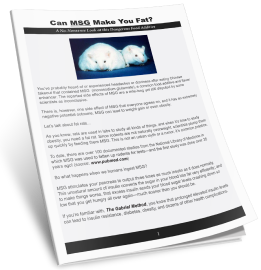Can MSG Make You Fat?
A No-Nonsense Look at this Dangerous Food Additive

You've probably heard of or experienced headaches or dizziness after eating Chinese takeout that contained MSG (monosodium glutamate), a common food additive and flavor enhancer. The reported side effects of MSG are a mile-long yet still disputed by some scientists as inconclusive.
There is, however, one side effect of MSG that everyone agrees on, and it has an extremely negative potential outcome. MSG can lead to weight gain or even obesity.
Let's talk about fat rats…
As you know, rats are used in labs to study all kinds of things, and when it's time to study obesity, you need a fat rat. Since rodents are not naturally overweight, scientists plump them up quickly by feeding them MSG. This is not an urban myth or a rumor, it's common practice.
To date, there are over 100 documented studies from the National Library of Medicine in which MSG was used to fatten up rodents for tests—and the first study was done over 35 years ago! (source: www.pubmed.com)
So what happens when we humans ingest MSG?
MSG stimulates your pancreas to output three times as much insulin as it does normally. This unnatural amount of insulin converts the sugar in your blood into fat very efficiently; and to make things worse, that excess insulin sends your blood sugar levels crashing down so low that you get hungry all over again—much sooner than you should be.
If you’re familiar with, The Gabriel Method, you know that prolonged elevated insulin levels can lead to insulin resistance, diabetes, obesity, and dozens of other health complications.
In the revealing book, The Slow Poisoning of America, John Erb, a former researcher at the University of Waterloo in Canada, explains the full history behind MSG and how it snuck its way into a startling number of processed foods we eat every day. Erb also discloses the many pseudonyms food companies use to “disguise” the MSG in their products.
MSG… You Might Not Know You're Eating It!
Most consumers already know to avoid MSG, and to combat the negative press, many food manufacturers simply call it by another name. Below is just a partial list of the many sneaky names manufactures use to hide the fact that their food contains a well-known excitoxin.
“Sneaky” Food Industry Names for MSG
- Gelatin
- Calcium
- Caseinate
- Ajinomoto
- Monosodium glutamate
- Hydrolyzed Vegetable Protein (HVP)
- Textured Protein
- Monopotassium glutamate
- Hydrolyzed Plant Protein (HPP)
- Yeast Extract
- Glutamate
- Autolyzed Plant Protein
- Yeast food or nutrient
- Glutamic Acid Sodium
- Caseinate Autolyzed Yeast
- Vegetable Protein Extract
- Senomyx
- Natural flavor
So, if the MSG-obesity connection has been common knowledge in the scientific community for nearly 4 decades, why is it still in our foods?
First of all, MSG makes foods taste great. When MSG was first discovered in Japan, its taste was given a new flavor name: “umami”. Just like adding sugar or salt to foods, MSG enhances the flavor of just about anything, plus it's really cheap! And since different forms of glutamate are great preservatives too, the combination of great taste and a long shelf life make MSG very desirable from a business perspective.
But for you? It's could potentially be a disaster…
My advice is to avoid MSG completely. Buy local produce and organic whenever possible. Read your food labels, avoid big brands, and just eat natural, whole foods the way that mother nature intended them to be eaten.
Here's the reality of the food processed food industry: without the MSG, the sweeteners, and flavor enhancers, most packaged foods would taste so bland and disgusting that no one would buy them. Let's you and I do our part and refuse to buy these foods right now, and we'll soon find our supermarket shelves stocked with more healthy, additive-free, delicious foods.


